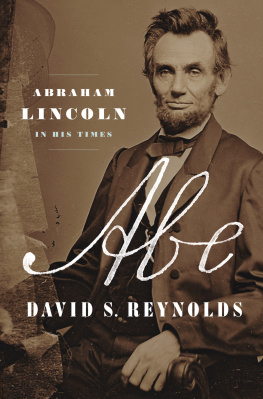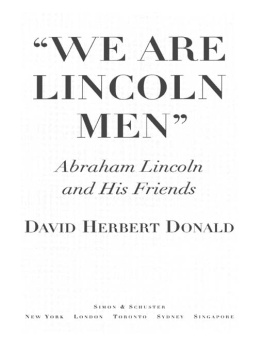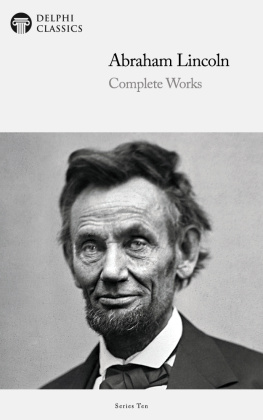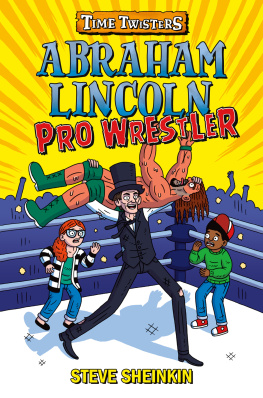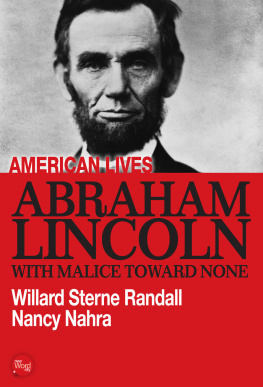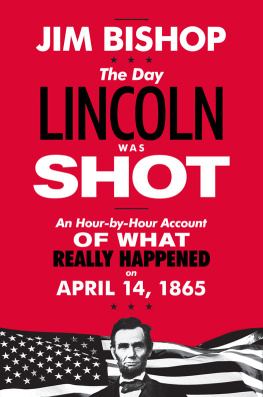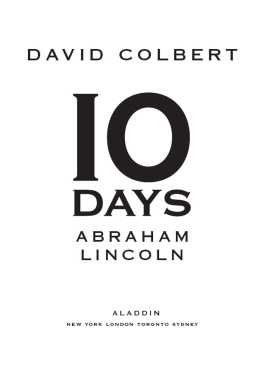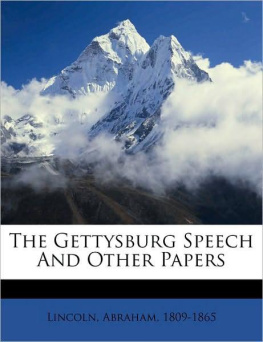David S. Reynolds - Abe: Abraham Lincoln in His Times
Here you can read online David S. Reynolds - Abe: Abraham Lincoln in His Times full text of the book (entire story) in english for free. Download pdf and epub, get meaning, cover and reviews about this ebook. year: 2020, publisher: Penguin Publishing Group, genre: Non-fiction. Description of the work, (preface) as well as reviews are available. Best literature library LitArk.com created for fans of good reading and offers a wide selection of genres:
Romance novel
Science fiction
Adventure
Detective
Science
History
Home and family
Prose
Art
Politics
Computer
Non-fiction
Religion
Business
Children
Humor
Choose a favorite category and find really read worthwhile books. Enjoy immersion in the world of imagination, feel the emotions of the characters or learn something new for yourself, make an fascinating discovery.
- Book:Abe: Abraham Lincoln in His Times
- Author:
- Publisher:Penguin Publishing Group
- Genre:
- Year:2020
- Rating:4 / 5
- Favourites:Add to favourites
- Your mark:
- 80
- 1
- 2
- 3
- 4
- 5
Abe: Abraham Lincoln in His Times: summary, description and annotation
We offer to read an annotation, description, summary or preface (depends on what the author of the book "Abe: Abraham Lincoln in His Times" wrote himself). If you haven't found the necessary information about the book — write in the comments, we will try to find it.
Abe: Abraham Lincoln in His Times — read online for free the complete book (whole text) full work
Below is the text of the book, divided by pages. System saving the place of the last page read, allows you to conveniently read the book "Abe: Abraham Lincoln in His Times" online for free, without having to search again every time where you left off. Put a bookmark, and you can go to the page where you finished reading at any time.
Font size:
Interval:
Bookmark:
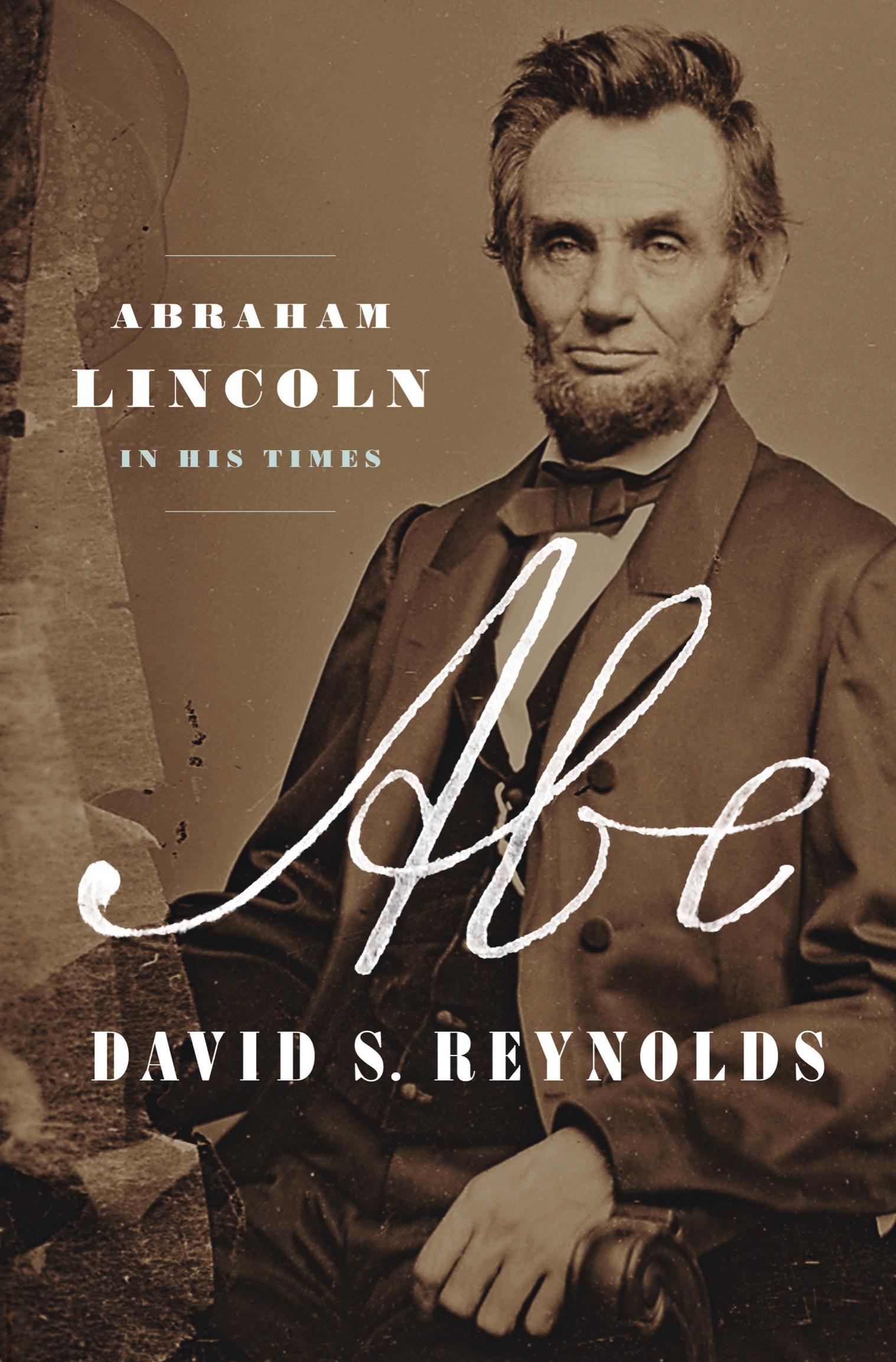
Walt Whitmans America
John Brown, Abolitionist
Waking Giant
Mightier Than the Sword
Beneath the American Renaissance
Faith in Fiction
Walt Whitman
George Lippard
Lincolns Selected Writings
The Quaker City
Venus in Boston (co-edited with Kimberly Gladman)
The Serpent in the Cup (co-edited with Debra J. Rosenthal)
Uncle Toms Cabin
A Historical Guide to Walt Whitman
George Lippard, Prophet of Protest
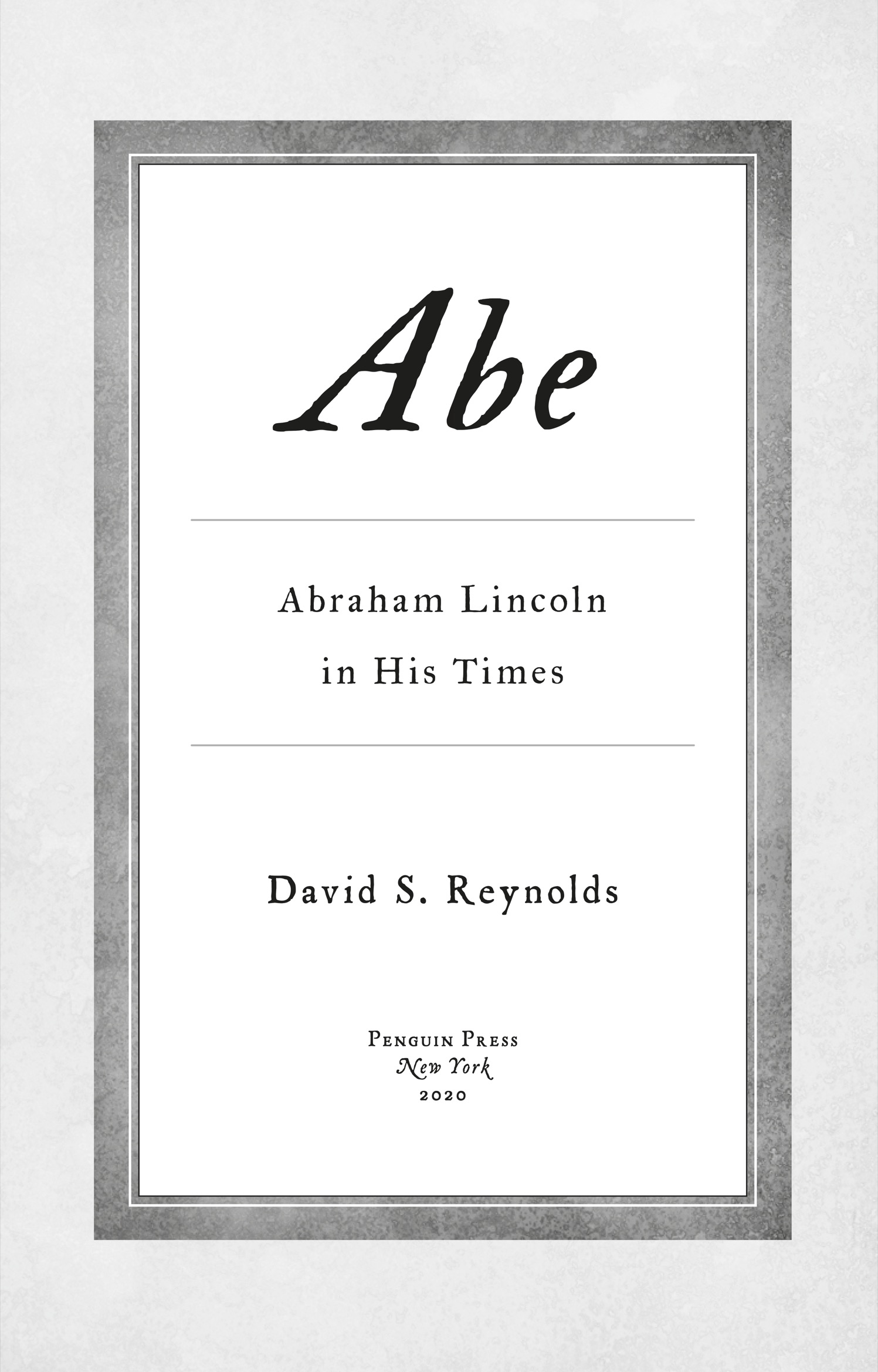
PENGUIN PRESS
An imprint of Penguin Random House LLC
penguinrandomhouse.com
Copyright 2020 by David S. Reynolds
Penguin supports copyright. Copyright fuels creativity, encourages diverse voices, promotes free speech, and creates a vibrant culture. Thank you for buying an authorized edition of this book and for complying with copyright laws by not reproducing, scanning, or distributing any part of it in any form without permission. You are supporting writers and allowing Penguin to continue to publish books for every reader.
constitutes an extension of this copyright page.
LIBRARY OF CONGRESS CATALOGING- IN-PUBLICATION DATA
Names: Reynolds, David S., 1948 author.
Title: Abe: Abraham Lincoln in his times / David S. Reynolds.
Description: New York: Penguin Press, 2020. | Includes bibliographical references and index.
Identifiers: LCCN 2019047287 (print) | LCCN 2019047288 (ebook) | ISBN 9781594206047 (hardcover) | ISBN 9780698154513 (ebook)
Subjects: LCSH: Lincoln, Abraham, 18091865. | United StatesSocial life and customs19th century. | PresidentsUnited StatesBiography.
Classification: LCC E457.2 .R48 2020 (print) | LCC E457.2 (ebook) | DDC 973.7092 [B]dc23
LC record available at https://lccn.loc.gov/2019047287
LC ebook record available at https://lccn.loc.gov/2019047288
Cover design: Evan Gaffney
Cover photograph: Smith Collection / Gado / Getty Images
pid_prh_5.6.0_c0_r1
To Suzanne, Aline, Haig, and Pat, and to the memory of my parents, Paul and Adelaide Reynolds, and my sister, Carla Reynolds Coleman
In this book, I have generally retained the original spelling, grammar, and usage in quotations from the era; I use sic only in some instances.
He liked to be called Lincoln, plain Lincoln, as one of his Illinois law associates reported. He was Mr. Lincoln to his wife, Mary Todd Lincoln; she also called him Fatherhe affectionately called her Mother or Molly. He was the Tycoon to his wartime secretaries John M. Hay and John G. Nicolay. In a Civil War marching song, he was Father Abraham. He hated the formal Mr. President. As though to mediate between the different possibilities, he signed his name A. Lincoln.
But to the millions, he was Abe. Honest Abe. Old Abe. Uncle Abe. Abe the Illinois Rail-splitter.
Lincoln did not especially like the Abe nickname, but he knew that without it he would not have won the presidency in 1860. His image as Abe, the approachable everyman from what was then the West, was promoted everywhere that year, and it swept him into office. He remarked, All through the campaign my friends have been calling me Honest Old Abe, and I have been elected mainly on that cry.
This book is the story of Abea cultural biography of Americas greatest president and its central historical figure. Placing Lincoln in his rich contexts, this book explores the ways in which his absorption and transformation of roiling cultural currents made him into the leader Leo Tolstoy hailed as the only real giant among all the great national heroes and statesmen of history, and whom Karl Marx called one of the rare men who succeed in becoming great, without ceasing to be good.
Among the some sixteen thousand books on Lincolnmore books than on any other historical figure except Jesus Christthere are many biographies, a number of them superb and several that contain illuminating information about his era. From the earliest biographies, there has been an interest in Lincolns politics; in recent times, that interest has expanded to include other aspects of the social and cultural scene. But there has appeared to date no full-scale cultural biography, which alone can capture Lincoln in his historical fullness.
The limitations of standard biography are visible even in one of the finest single-volume books on the sixteenth president, David Herbert Donalds Lincoln. The story Donald tells is by now familiar. Born in 1809 in a one-room log cabin in frontier Kentucky, the son of undistinguished parents, Lincoln, with less than a year of formal schooling, rose to the pinnacle of power through hard work, intelligence, political shrewdness, and a good amount of luck. Donald relates the story amply and adeptly. But he doesnt go far beyond the facts of Lincolns life. Stating that his is a biography written from Lincolns point of view, he writes, I have stuck close to Lincoln, who was only indirectly connected with the economic and social transformations of the period.
Convinced, surprisingly, that nineteenth-century America offered few nurturing materials, Donald presents Lincoln as the quintessential self-made man, who displayed enormous capacity for growth, which enabled one of the least experienced and poorly prepared men ever elected to high office to become the greatest American president. Some version of this single-handed climb from primitiveness to greatness narrative informs other biographies as well.
Even the popular culture around Lincoln, in Donalds view, was tame and uninterestinga cotton-candy sea of maudlin writing and preachy effusions, as captured in Donalds generalization about the Civil War era: The feminine fifties were gone, but they were followed by the sentimental sixties and the saccharine seventies.
Its true that there was a sentimental strain in the culture that held appeal for Lincoln. But the cultural scene was also ablaze with sensationalism, violence, and zany humorliterature, penny newspapers, music, and popular exhibits full of strange, freakish images that sometimes verged on the surrealistic. This was the bizarre, turbulent popular culturesulfuric acid, not sapthat Lincoln participated in daily in his own jokes and stories, which were modified versions of an American humor, whose chief characteristic, he said, was grotesqueness.
The current book reveals that Lincoln, far from distanced from his time, was thoroughly immersed in it. When he entered the presidency, he was neither inexperienced nor unprepared. To the contrary, he redefined democracy precisely because he had experienced culture in all its dimensionsfrom high to low, sacred to profane, conservative to radical, sentimental to subversive.
Ralph Waldo Emerson noted that genius lies in being altogether receptive; in letting the world do all, and suffering the spirit of the hour to pass unobstructed through the mind. In Emersons words, A great style of hero draws equally all classes, all the extremes of society, till we say the very dogs believe in him. The person who most fully represented this breadth of vision, Emerson wrote, was Americas sixteenth president:
Abraham Lincoln is perhaps the most remarkable example of this class that we have seena man who was at home and welcome with the humblest, and with a spirit and a practical vein in the times of terror that commanded the admiration of the wisest. His heart was as great as the world, but there was no room in it to hold the memory of a wrong.
Font size:
Interval:
Bookmark:
Similar books «Abe: Abraham Lincoln in His Times»
Look at similar books to Abe: Abraham Lincoln in His Times. We have selected literature similar in name and meaning in the hope of providing readers with more options to find new, interesting, not yet read works.
Discussion, reviews of the book Abe: Abraham Lincoln in His Times and just readers' own opinions. Leave your comments, write what you think about the work, its meaning or the main characters. Specify what exactly you liked and what you didn't like, and why you think so.

